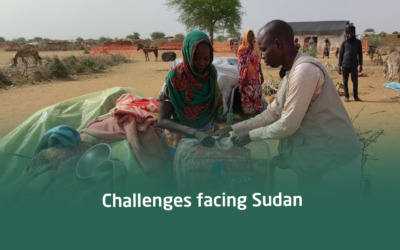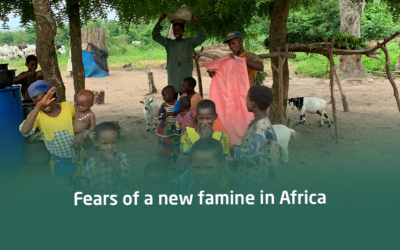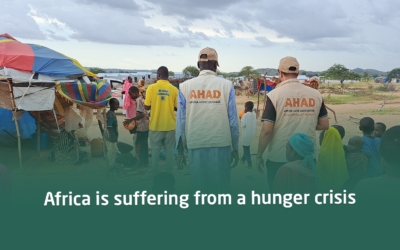Education in Africa
Education is one of the most important factors affecting the socio-economic development of any society. In Africa, Education is the cornerstone of progress and prosperity. However, the continent faces major challenges that hinder its education system, such as poverty, lack of infrastructure, political conflicts, and gender discrimination. These challenges significantly impact the educational opportunities available to children and youth in many African countries.
Challenges facing education in Africa
Poverty
Poverty is one of the biggest barriers to education in Africa. The deteriorating economic conditions in many African countries are having a significant impact on families, making them unable to afford education. This includes tuition expenses such as school fees, books, school uniforms, and transportation. In addition, many families consider sending children to school to be an unaffordable cost, which leads them to prefer that children work to help the family financially instead of going to school.
In some rural areas, access to basic education resources is a major challenge. Children lack access to nearby schools, which means that traveling long distances to get to school becomes necessary, and this represents an additional cost. Even in areas where schools are available, these schools are often poorly equipped, lacking the basic resources needed to provide a quality education.
Lack of infrastructure
Many schools in Africa suffer from an acute shortage of basic infrastructure, which significantly affects the quality of Education. Infrastructure problems include a lack of adequate classrooms, sanitation, and clean water. In some cases, children are taught in temporary or outdoor classes, which makes it difficult to concentrate and learn in an uncomfortable or safe environment.
Some schools are also experiencing a shortage of educational materials and study tools. It consists in the fact that there are not enough textbooks, educational tools such as paintings, computers. This deficiency negatively affects the ability of teachers to deliver effective lessons and the ability of students to learn effectively.
Political conflicts and security unrest
Political conflicts and security unrest in some African countries significantly disrupt the educational process. Schools are being closed in conflict-affected areas, depriving children of access to education. Children and their families are forced to flee their homes in search of safety, and this forced migration hinders the educational stability of children.
In addition, children are sometimes recruited as combatants in armed conflicts, which keeps them away from schools and puts them at great risk. Such children lose their opportunity for education and are exposed to many traumatic experiences that negatively affect their development and growth.
Gender discrimination
Girls in some African regions still suffer from discrimination in accessing education. Some cultures believe that girls ‘ education is unnecessary or that a girl’s role should be limited to housework and Family Care. This discrimination leads to lower school enrolment ratios among females compared to males.
In addition to cultural discrimination, girls face additional risks such as early marriage and early pregnancy. Early marriage often means the end of a girl’s education, as societies expect her to focus on her duties as a wife and mother instead of continuing her education. Early pregnancy also hinders girls from continuing to study, as they find it difficult to reconcile the responsibilities of motherhood and education.
The challenges facing education in Africa are many and complex, but with political will and international and community cooperation, these obstacles can be overcome. Education is the key to sustainable development, an investment in the future. By strengthening the efforts of governments, international organizations and local communities, it is possible to improve the education system in Africa and ensure that every child has the opportunity for a quality education. Investing in education is not only an investment in individuals, it is an investment in the future of the entire continent, and enhances the ability to achieve sustainable development and prosperity for all the peoples of Africa.

Efforts to improve education in Africa
Governmental and international initiatives
African governments, in cooperation with international organizations, are working to improve the education system on the continent through several steps and projects, which can be summarized as follows:
– African governments cooperate with international organizations such as the United Nations, the World Bank and UNICEF to finance and establish new schools, especially in rural and remote areas. These efforts are aimed at increasing the number of schools and reducing overcrowding in classrooms, providing a better learning environment for children.
– Textbooks and other educational materials are provided through partnerships with NGOs and the private sector. This aims to ensure that all students have the necessary resources to achieve academic success.
– Teacher training programs are an essential part of the efforts made. It organizes workshops and training courses to enhance teachers ‘ skills and knowledge, which contributes to improving the quality of Education. These programs include training in the latest teaching methods, classroom management techniques, and the use of technology in education.
– *Scholarships are offered to students from poor families to ensure their continuation in education. These scholarships include covering tuition fees, book costs, and sometimes even living costs. These programs contribute to reducing the percentage of school dropouts among students who face financial difficulties.
Local and community programs
Local and community programs contribute to the promotion of education through various initiatives aimed at directly supporting schools and families:
– Awareness campaigns are organized to enhance local communities ‘ understanding of the importance of education and its role in achieving sustainable development. These campaigns include workshops, seminars, and community meetings aimed at changing negative perceptions about education, especially girls ‘ education.
– Psychosocial support is an important part of Education Improvement Programs. Counseling and psychological support services are provided for children who have been exposed to difficult experiences such as armed conflicts or natural disasters. This support is aimed at helping them overcome psychological trauma and restore educational stability.
– Local initiatives contribute to the establishment of educational centers that provide a convenient learning environment for children in remote areas. These centers provide additional educational courses, strengthening classes, workshops that help students improve their academic level.
Technology in education
Technology plays an important role in improving education in Africa, providing innovative solutions to educational challenges:
– E-learning can be an effective solution to reach students in remote areas. Online classes are offered through educational platforms, allowing students to access educational resources at any time and from anywhere. Such programs can include study materials, instructional videos, interactive assessments.
– Technological innovations such as smart boards and tablets can improve the quality of education within the classroom. Smartboards are used to deliver lessons in interactive and engaging ways, while tablets are used as educational tools that enable students to access digital libraries, educational programs, and educational applications that help them improve their academic skills.
– Technology contributes to improving students ‘ access to information and knowledge. Students can use the internet to search for information, conduct research, and interact with educational content in New and innovative ways. Teachers can also use the educational resources available online to improve lesson plans and provide various educational materials.
Improving education in Africa requires concerted efforts by governments, international organizations, and local communities. Through government and international initiatives, local and community programs, and the use of technology in education, many of the challenges facing the continent’s education system can be overcome. Investing in education is not only an investment in the future of individuals, it is also an investment in the future of the whole of Africa, and enhances the ability to achieve sustainable development and prosperity for all.
The role of AHAD in education in Africa
AHAD plays a vital role in improving the quality of education in Africa, especially in the countries of the central and western continent. The association works to implement educational projects aimed at providing an appropriate educational environment, promoting education opportunities for all, and supporting local communities in achieving sustainable development. The following are the most prominent efforts and initiatives carried out by the AHAD Association in this field:
AHAD works on building and equipping schools in rural and remote areas where there is an acute shortage of educational infrastructure. These efforts include building classrooms, providing school furniture, and providing schools with sanitation and clean water. This contributes to providing a convenient and stimulating learning environment for children.
The association provides textbooks, teaching aids, and other school supplies to students and teachers. This ensures that all students have the necessary resources to achieve academic success and relieves the financial burden on poor families.
AHAD considers teacher training one of the key priorities for improving the quality of Education. The association organizes training programs and workshops aimed at developing teachers ‘ skills and enhancing their knowledge of modern teaching methods. This includes training in the use of technology in education, effective classroom management, and providing psychological and social support to students.
AHAD supports community education programs that aim to provide educational opportunities for adults and youth who were unable to attend school at an early age. These programs include literacy education, vocational training courses, and health and social awareness programs. These programs contribute to the empowerment of individuals and enhance their effective participation in society.
AHAD relies on building strong partnerships with local governments, international organizations, and local communities to ensure that its educational projects are implemented effectively and sustainably. This collaboration helps in pooling the resources and expertise needed to achieve the goals of education and sustainable development.
Through these diverse initiatives, AHAD contributes to improving the quality of education in Africa and providing equal educational opportunities for all. Its efforts contribute to building a supportive and stimulating educational environment, enabling individuals to acquire the skills and knowledge necessary for academic success and effective participation in economic and social development.
AHAD plays a pivotal role in promoting education in Africa through its integrated and comprehensive initiatives. With its focus on building and equipping schools, providing educational materials, training teachers, supporting girls ‘ education, and using technology in education, AHAD contributes to achieving sustainable development and improving the quality of life for the communities it serves.
You can visit the AHAD website to find out more about the projects it offers
ALSO READ
WHAT THE FOOD BASKET CONTAINS IN AHAD
Join us in our message




